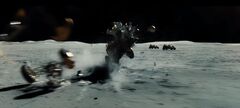{★★★★}
James Gray is keen to explore father and son in his films, a same tacit understanding and divergence that is distorted, refracted, and obscured under different backgrounds, but in "Interstellar Exploration", he has taken a crucial step An important step: treat the protagonist in the film as his own incarnation, and analyze the spiritual bond between father and son through the inner monologues of the people in the play. In other words, he hides in the script and delivers to the audience the subject he is familiar with in the voice of a psychotherapist, and we have never been so bluntly and frankly hit by naked emotions.
But wait a moment, before everything else, let us not forget that "Exploration" is a science fiction film. It is indeed that, in the past ten years, well-known space science fiction films have gradually become a common trend with people’s interest in the fading of the universe, until this year’s 50th anniversary of the moon landing, more documentary films and biographical films. Also joined the ranks of their journey of boundless stars. But from the more traditional "Martian Rescue" to the more unconventional "Gravity", they are not the faction that "Exploration" should belong to. This is not because James Gray is the so-called anti-genre director who is described by everyone, but because these movies choose not to touch, or at least not to stare at the most ubiquitous medium in the vast universe: loneliness.
Ridley Scott has thought about the existential crisis of human beings drifting in space, of course, but only the leftover light has been swept away; Alfonso Cuaron went further, he not only used the leftover light, but also looked up and down the look of this behemoth, and borrowed digital film Let the audience in the theater be immersed; only James Gray cast his gaze into the abyss, not looking away for a while. Comparing the triangles, what is magnified? It is the beauty of the universe. Compared with the black and white set of Gravity, Discovery has greatly broadened the spectrum, from the black and white of the moon, to the dim red of Mars, to the blue of Neptune, this way of paying tribute to the science fiction films of the 1980s from the color filter. People can't help but drown in the unreal blurred light and shadow. Not to mention the deliberately slowing down of photography and frequent empty shots, both sublimate this beauty to a fascinating divine realm.
But the grand beauty is related to the hollow core. The magnificence of the universe, as Roy said in the film, there is nothing under it. The magnified magnificence also means the spread of nothingness, the more contrast, the deeper the understanding of the insignificance of life. This is exactly one aspect of the most exciting aspect of this movie: pulling away from the pure story and returning the line of sight to the inside of the characters. But don't think that Gray will ignore the story. On the contrary, he also chooses to use plot design to reinforce the meaninglessness of this instinct. Fighting for resources, encountering attacks, and defying orders-these already outstanding bridges have not only enhanced the entertainment of the film, but also spread the sudden death in front of the audience. When you are about to establish an emotional connection with a certain character, the next moment the story announces his immediate death without warning. This absurdity of being engulfed in space is just the body of the all-pervasive atmosphere in the film.
So when the audience became aware, they had already had a psychological connection with Roy. As long as we don't resist, Roy's isolation and autism can easily win our empathy. But his loneliness is the solitude of gregariousness. At the beginning of the film, he even wanted to go to the universe to escape the hustle and bustle behind him, but he was lost in the endless silence. Thus, the other side of the movie's excitement is also evident: Gray used space travel to blend two different kinds of loneliness, that is, use one extreme loneliness to pour the other extreme loneliness. As the movie progresses, Roy's psychology has also changed. To make this clear, you have to return to the question at the beginning of the article: Father and Son.
Regarding the relationship between father and son in "Exploration", everyone has very different opinions. Some friends said that this is just a healing story of a person who lacks father’s love in growing up. It is ordinary and mediocre. Other film critics such as Brian Tallerico said that the father and son have a religious orientation. He gradually transitioned from perfection to incompleteness (gradually disordered heart rhythm), and finally fell into the world. This is, from a certain angle, the correct interpretation. But I think the message that the film wants to express is neither simple nor profound. It is more universal and sad. It describes to us a hypothesis that may come true at any time: your father is just a mystery, and you want to find it all your life. The things are actually out of reach.
What a heartbreaking fact. Like Roy, we look forward to growing up with our parents, but never wonder if we really know them? Until one day when you wake up, you find that your favorite person has become an unfamiliar silhouette. The sculpture in your memory has collapsed. What's more cruel is, whose shadow adult have you been chasing? Fetters turn into lies. This is not only Roy's unspeakable predicament, but also the disaster that most people worry about. But no matter how they are absent, some day in our lives, we all become fathers. Just like Roy loves to blame his father, but he also becomes like his father who longs for a refuge in space; just like the son in "The Fence", hating and cursing his father, he can't escape and become his most annoying appearance. .
But one day we will find that we are different from our father. This is the theme conveyed by James Gray and "Exploration" in a roundabout way. Roy didn't realize until he was burned endlessly by space. His loneliness is loveless loneliness, and his home is the escape home; his father's loneliness is the loneliness of gregariousness, and his home is at the edge of the universe. When the movie reached its climax, Gray's shots captured the most revelatory scene in the film: Roy and his father were connected by a rope, and finally Roy untied the rope, and his father slowly drifted away. Its symbolism is so strong and clear, I even think this will be the perfect ending picture: the bond between children and parents will be broken, and then, we will make choices, carry pain and hope in the opposite direction The direction is drifting away from them.
View more about Ad Astra reviews











